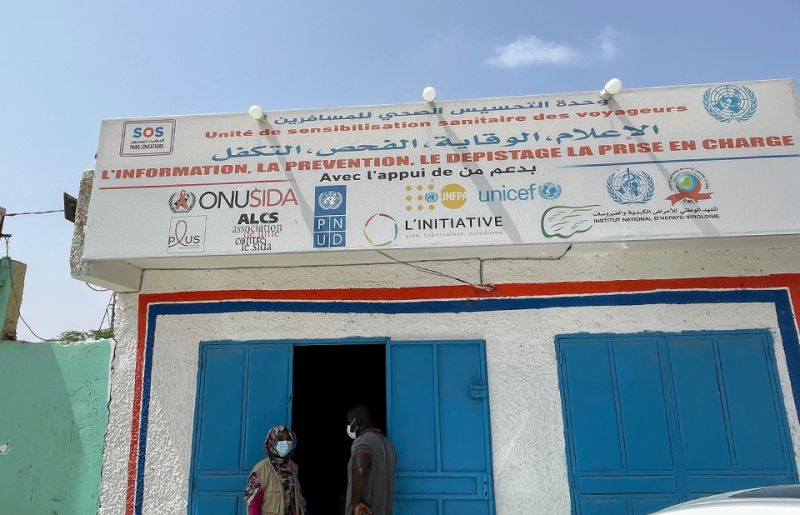In a suburb of Nouakchott, Mauritania, a tent has gone up for an evening of counselling and HIV testing. Staff of the nongovernmental organization SOS Pairs Educateurs field questions, and people wanting to know their HIV status queue for a rapid test.
Mohammed Bilal, above, is supervising the evening event, along with peer educators, a nurse and a social worker. Pointing behind him to a small concrete house with a corrugated roof, he said that to keep all tests anonymous, people are given a number and they enter the makeshift office one by one. “We do counselling before the HIV test and after the person gets the results,” Mr Bilal said.
More than 70 men and women have opted to get a rapid test today.
In the El Mina neighbourhood, where the outreach event is taking place, Mr Bilal says that most people scrape by making a living, many women live alone raising children and most children don’t attend school. He grew up here and knows the community well. He and his team also know the needs of the people. For Mohammed Mouloid, above right, the Programme Coordinator at REMAP+, a network of people living with HIV, community outreach fills a big gap. During the COVID-19 restrictions, for example, they teamed up with SOS Pairs Educateurs, UNAIDS and others to distribute food kits.
Adjusting his glasses, Mr Mouloid said, “Before a person takes their medicine, they have two other priorities. The person has to eat first and find transportation to pick up their treatment. If both are not combined, then the third priority falls by the wayside and the person will never take their treatment.”
“Our biggest problem in Mauritania is stigma associated with HIV,” Mr Mouloid said, explaining that people living with HIV often drop out of treatment programmes. Only 40% of the 8500 people living with HIV in the country are on life-saving treatment. Mr Mouloid has lived with HIV for nearly 20 years and was one of the first people in Mauritania to take antiretroviral medicines, in 2004. “I have been married twice and have two children who are both HIV-negative, so I am a testament to living a healthy life, but things are tough in our society,” he said.
The HIV epidemic in Mauritania is concentrated in cities and among key populations. HIV prevalence among adults is around 0.3%, but is 9% among sex workers and 23% among gay men and other men who have sex with men. Mauritania criminalizes sex work and same-sex sexual relations, so people tend to hide.

To reach out to key populations, SOS Pairs Educateurs, with the support of the United Nations and partners, recently opened a drop-in centre, above, in front of the bus station in the capital city (they have eight other drop-in centres around town). A television blasts in the corner as peer educators mill about chatting with a truck driver. A pilot project distributing HIV self-test kits that people can use in the privacy of their own home has also been undertaken.
Sharif (he did not want to give his last name) explains that he stops by regularly to pick up condoms and get information from the counsellor. “I came here to know more about COVID-19 and other health risks,” he said. He said he had never taken an HIV test, which are provided for free, but was thinking about it.
According to the UNAIDS Country Director for Mauritania, El Mustapha Attighie, community outreach like this is a way to support vulnerable groups.
“Stigma hinders our response to HIV and if human rights are not respected and people are left behind, this increases the risks of HIV,” he said. He added that UNAIDS’ mandate clearly states advocating for rights and treatment for all and as a trained doctor he focuses the debate on people accessing health care.
He believes that Mauritania could end AIDS by 2030. “We have the opportunity to make this objective a reality,” he said. “Channel more money and means where the epidemic is, to quash it and also stop it from reaching a broader population.”
SOS Pairs Educateurs has expanded its activities to reach different populations. It founded a school for street children and children who have dropped out of school and organized trainings for girls in sewing as well as a teen dance group. “Here for many the reality is that you have little hope so by having kids succeed in school or on the dance floor, it boosts them and impacts the entire family,” said the SOS Pairs Educateurs Director, Djibril Sy, above. He grew up in El Mina and still lives there, saying that countless people have benefitted from its work in the past 20 years. “Aside from hope, we really try to instil a sense of self-worth,” he added, explaining now that he wants to give young people trainings in entrepreneurship.
Despite progress, western and central Africa represents 8% of the world population but is home to 12% of all people living with HIV globally and experiences 22% of all AIDS-related deaths in the world.
Source link : https://www.unaids.org/en/keywords/mauritania
Author :
Publish date : 2021-11-25 08:00:00
Copyright for syndicated content belongs to the linked Source.





